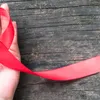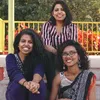Diagnosed with HIV at 18, and given only 3 months to live, this changemaker continues to raise awareness about the disease
In 1993, Jahnabi Goswami contracted HIV from her husband. She was told she had only three months to live. Twenty-seven years later, she is going stronger than ever, spreading awareness on HIV/AIDS in India.
Awareness around HIV/AIDS disease has made little progress in India. For the longest time, voices of individuals and organisations to raise awareness around the disease with no definite cure has been the need of the hour. Jahnabi Goswami (44) is happy to be one such staunch voice.
The first woman from the northeast Indian states to make her HIV-positive status public, Jahnabi is also the founder of Assam Network of Positive People (ANPP) and the first woman president of Indian Network for People living with HIV/AIDS (INP+).
“Being vocal will reduce the stigma. The social taboo surrounding HIV/AIDS harms people’s life socially and economically,” she tells HerStory.
Jahnabi says many have lost jobs and have had to remain socially aloof. Employers would state reasons of underperformance after learning about their HIV+ status and landlords would not rent houses. Such was the case in Assam 27 years ago when Jahnabi was diagnosed with HIV.
Living loud with HIV+
Growing up in Kampur in the Nagaon district of Assam, her politician father, Hiranya Goswami was killed by ULFA militants.
On November 27, 1993, she was diagnosed with HIV and was told she had only three months to live. Her in-laws had hidden the fact that her husband carried the HIV virus and passed on the condition to her daughter Kasturi who died at the age of two.
She returned to her own family, and her mother became the backbone of her life. “Without her motivation, I wouldn't be where I am today. Every day, she would tell me, ‘you can do it, you can do it… why not? I don't want to see many more Jahnabis in our society,” she recalls her mother’s words that kept her going.
In the beginning, she started welfare work for her mother but soon was caught by the dire need for awareness and since then, there has been no looking back.
In 2004, she founded the Assam Network of Positive People, educating the various aspects of the disease from prevention and cause to steps to take after contracting the disease, and liaising with the government.
The activist has seen the educated population, religious and social institutions in the state being intolerant of people living with HIV. Jahnabi believes such behaviour does not help and that people living with HIV should come forward to fight the social stigma.
She believes that World AIDS Day, introduced to raise awareness, has lost its meaning in India.
“I refuse to consider this day because it has become a festival for the government to celebrate. They are not observing but celebrating World AIDS Day by inviting ministers and celebrities,” Janhabi says.
“For me, every day is World AIDS Day. It should be observed and not celebrated for political propaganda, the key word here being observe.” she adds.

Sex education and more
A few years ago, Jahnabi came across a 14-year-old girl living with HIV+ and the cause was unknown. With no history of blood transfusion and both the parents having no record of HIV, Jahnabi points out it is likely that it was contracted after sexual abuse. This is one staple case.
This is why she reiterates that promoting sex education is one of the two main resolve in her current role as president of Indian Network for People living with HIV/AIDS (INP+).
Although accepted in pen and paper, in reality, the government has not accepted the challenges of HIV.
Jahnabi is working towards making sex education a mandatory subject in school curriculums, not just for adolescents but younger students from fourth and fifth standards as well.
Ensuring access to treatment is another concern. She says every district should have a treatment centre equipped to deal with patients at the district level because the poor can't afford to travel often.
“Bureaucrats are of different mindsets. They boss around with their qualifications and arrogance but are also tied to multiple responsibilities and are not able to act and address these challenges.” she asserts.
Jahnabi also receives queries from families of people living with HIV+ and has started a YouTube channel to address common doubts and questions regarding treatment and side effects of HIV-AIDS. She also focuses on counselling them in her individual capacity.
Jahnabi is now a known figure for her activism against HIV/AIDS. But even today, there are days when she ruminates on the possibility of a life without HIV. In those thoughts, she is either a legal advocate or a politician like most of her family members – just as she dreamt as a girl.
Edited by Rekha Balakrishnan









